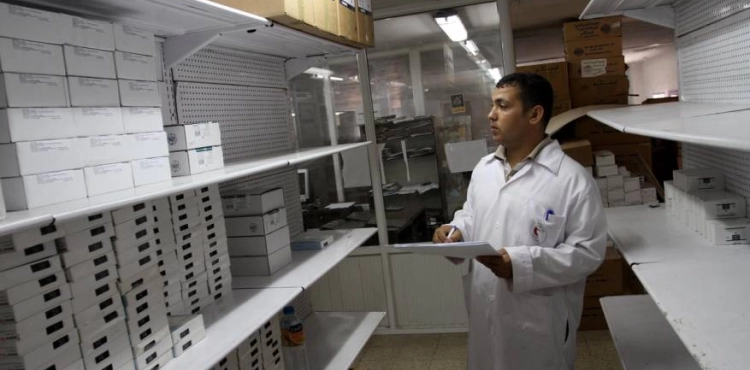The Palestinian Ministry of Health in the Gaza Strip warned Tuesday that the shortage of medicines and medical consumables has entered difficult stages and is threatening the lives of patients.
"The words and images are no longer able to describe the tragedy that the patients in the Gaza Strip have reached," said Mounir al-Bursh, director-general of pharmacy at the Ministry of Health in Gaza, at a press conference held Tuesday at the Shifa Medical Complex in Gaza City. And the moments of pain are suffocating every dream of healing as the crisis of shortage of medicines that bother the medical staff. " He added that "these serious data and indicators will put the whole health services in front of difficult challenges, especially with the case of bleeding continuously in the vital and vital stocks in the absence of serious interventions from the concerned parties to strengthen the basic components of health services of medicines and medical consumables and laboratory supplies and blood banks." Al-Bursh reported that 50 per cent of essential medicines had disappeared, meaning that more than half of Gaza´s patients were treated without a shortage of 25 per cent of medical consumables and 60 per cent of laboratory supplies and blood banks. That the whole health service has become in the eye of the storm and that other types are threatened to run out with the absence of any serious solutions on the horizon to end the crisis, "he said. The Israeli occupation has taken full responsibility for the lives of patients and preventing the entry of medicines and the consequent deterioration of health indicators due to the continuation of its illegal and inhuman blockade of the Gaza Strip, preventing delegations and convoys of relief and preventing and preventing 40% of patients from accessing specialized hospitals in the occupied home. "The total value of pharmaceutical imports for hospitals and health centers in the first half of the year was $ 12.8 million, of which $ 1.2 million was from the Ministry´s warehouses in the occupied West Bank, or about 3 percent of our annual pharmaceutical needs, 40 million dollars. " He added: "The deficit in the services of patients with kidney disease 55 per cent, including a shortage of hormone Erythropotin for the third month in a row necessary for the treatment of anemia for kidney failure patients and kidney transplantation of 1150 patients, making these patients in front of a difficult option for continuous blood transfusion, Kidneys from the inability to inject iron and venous calcium, filters and pipes of the total wash that is about to run out. He pointed out that cancer patients and blood diseases suffered from paralysis in the completion of their therapeutic protocols because of the depletion of 62 per cent of their medicines. He explained that the maternal and child health service is one of the most affected by the medical deficit, with 69 per cent disability, which threatens the lives of more than 450 per month per month, as well as the severe shortage of blood tonic for pregnant women and children, Blood I have these categories. He stressed that more than 150 patients, half of them children with hemophilia, suffer from severe deficit in the factors of coagulation Factor 8 and Vector 9, which causes them to chronic injuries in the joints, and more than 250 patients with thalassemia of treatment, which leads to increase the proportion of iron deposition Putting them at risk. He pointed out that the deficit in primary care drugs reached 69%, which threatens the overall services provided to patients (pressure - sugar, crisis and blood liquidity) in addition to the suffering of patients, children and mothers of severe shortage of antibiotics and painkillers and medicines for daily care. He confirmed that there is a shortage of catheterization and open-heart surgery services by 53 per cent, which increases the number of cases transferred abroad for treatment and threatens the lives of patients under Israeli practices. The Palestinian official called on all rallies and relief institutions to speed up the deterioration to mobilize the necessary support to provide medicines and medical consumables to patients. He stressed that there are no solutions on the horizon, calling on the international community to end the siege on Gaza and work hard and immediately to protect the therapeutic rights of patients in the Gaza Strip and to provide urgent medical needs. The Israeli occupation imposed a strict siege on the Gaza Strip for 13 years. All crossings and border crossings connecting Gaza with the outside world are closed through Egypt or the occupied Palestinian territories in 1948, except for the partial opening of some goods and passengers. And the impact of the siege imposed on the Gaza Strip, the health situation of the sector, which led to the decline of the health system in the absence of medicine, and the entry of the electricity and fuel crisis on the health sector seriously.












